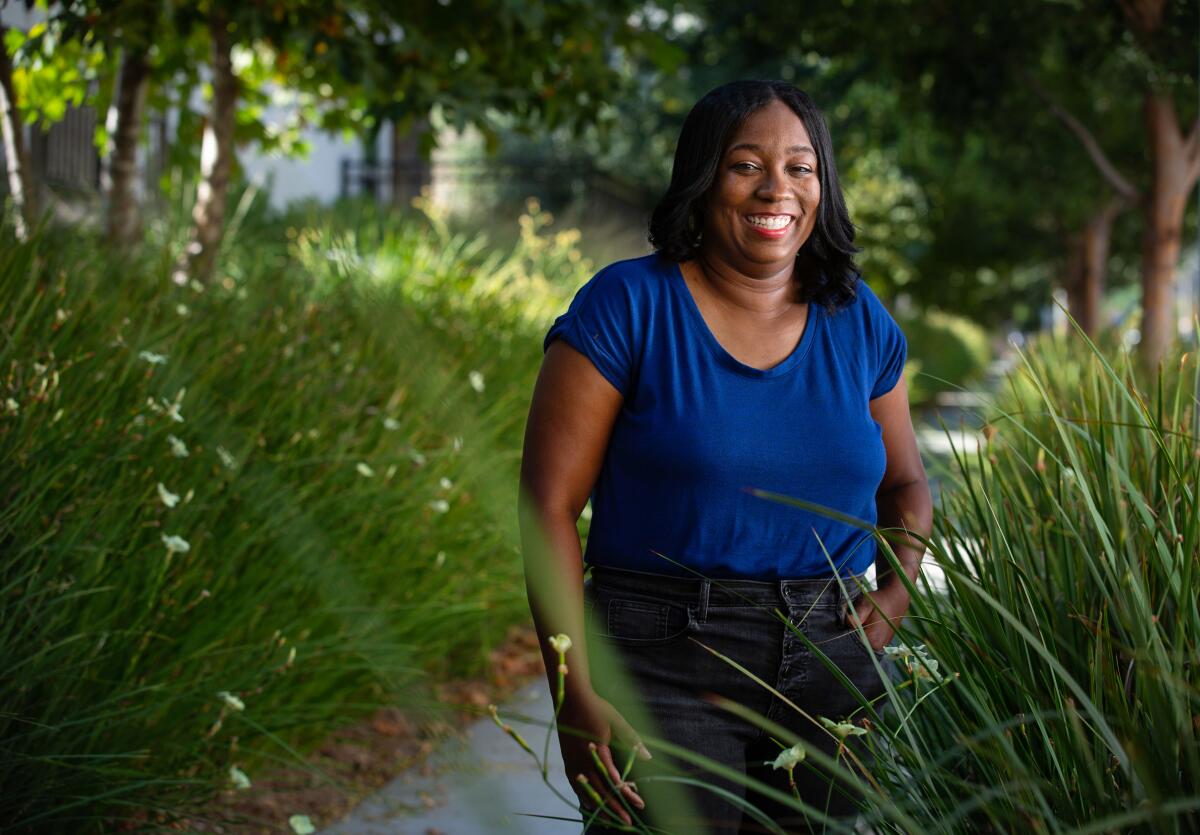Her mom inspired her book on race and identity. Then came the Hollywood bidding war

Novelist Brit Bennett remembers the day her mother began reeling off stories from her Southern past. There was one story too good to let slip by.
“She brought it up the way parents often do, like it’s something everybody knew … that there were towns where people would intermarry so that their children would get lighter with each generation,” Bennett recalls. “And I was like: ‘Wait! Go back to that.’”
Captivated, Bennett pulled out her phone and jotted down one sentence. That was in 2015. The idea took root. Next, twin sisters and a Louisiana landscape sprouted, then filled in. That single sentence became the foundation for Bennett’s new book, “The Vanishing Half,” a novel that has topped bestseller lists this summer and spurred a Hollywood bidding war.
Her mother was born and raised in rural Louisiana in a small town named Palmetto, while Bennett grew up in Oceanside in San Diego County. “So I’d never imagined a town like this,” she says. “It stuck with me, I think, because it was a very different way to think about skin color and an attempt to genetically engineer your population. It was very specific and very disturbing.”
Bennett, who joins the Los Angeles Times Book Club Aug. 25 for a virtual meet-up, knew immediately that her mother’s story was the doorway to a larger story she wanted to explore. “It felt big and expansive.”
Touching on themes of race, identity, love and empathy, “The Vanishing Half” is an elegant multi-generational portrait of the deep fissures within a family cleaved by the choices twin sisters — Desiree and Stella — make when they break away. What they find, Bennett writes early in the narrative, “You can escape a town but you can not escape blood.”
“Initially, I just had this image of this very light-skinned woman holding the hand of this very dark-skinned girl returning to this town and people being really awful about it,” Bennett says. “I love books like ‘Their Eyes Were Watching God,’ these stories where a woman has mysteriously returned and everybody is trying to figure out why.”
Bennett says it was Desiree who came to her first in form and intent. In the opening pages, Desiree reappears in Mallard, a fictional town based on Bennett’s mother’s tossed-off memory. She arrives with daughter Jude in tow to the backdrop of suspicious whispers.
But it was Stella, the younger twin, whose story bedeviled Bennett. The character cuts all ties with her past and decides “to pass” — to live as a white woman. “There is an evasiveness to her,” Bennett says. “I wanted to lean into that mystery and into the things that were entrancing and confounding.”
The language of passing is one steeped in metaphors: And too it trails with it a whiff of antiquity —”crossing over,” “passe blanc,” “gone over.” Bennett wanted to explore this exercise in euphemism — these spiritual deaths and rebirths —as she teased out the notion of passing as a trope.
“The foundational text for me as a kid was ‘Imitation of Life,’” Bennett said, referring to a movie adaption of Fannie Hurst’s 1933 novel. “I think it’s an entry point for a lot of us, certainly, a canonical film about passing.
“It’s a melodrama, and there is also a sense of punishment in the film. One of the ways that I wanted to deviate from that was I didn’t want to write a moralizing story. I had no interest in the question: Is Stella right or wrong? That wasn’t interesting to me aesthetically. I didn’t even find it an interesting moral question.”
More compelling, Bennett observes, the transgression redefines the category of whiteness as being “precious” and that by “sort of stealing it” you deserve to be punished. She asked herself: “Should a character be punished for slipping into this social category that too is a construct?”
Bennett knew that she was writing into a storied literary tradition — memoirs, novels, screenplays and scholarly works that explore entire branches of families that vanished into ether and out of memory. But she was coming at it with fresh eyes: “I was writing from the perspective of a 21st century, 30-year-old person,” she says. “We think about identity categories now with much more fluidity. What does it even mean ‘to pass’? If we consider these categories to be unstable or inherently unclear or fluid.”
The story’s starting point is Louisiana, the insular community of Mallard, and then the narrative migrates to the West Coast, specifically Los Angeles, which has long been an end-of-the-line outpost for reinvention.
“Part of my thinking was here was a place where Stella could show up that would be so completely different from where she left,” Bennett says. “Stella performed her whiteness, which was different from being white in the South.”
The Southern California setting also gives Bennett a space to engage and challenge her other characters. She introduces Desiree’s now-grown daughter, Jude; her boyfriend, Reese, and their vibrant found family. They are young people coming into themselves, trying on guises and new personas to see how they settle. Readers also meet Stella’s daughter, Kennedy, who resents her mother’s many secrets. “L.A. was a place where all of the other characters could collide,” Bennett says.
“The Vanishing Half,” being adapted into an HBO limited series, lands at an unprecedented moment. The death of George Floyd, the Black man killed during a May arrest by Minneapolis police, has sparked candid discussions about racism, racial hierarchies and privilege.
“I was working on this book for years,” says Bennett, author of a previous bestseller, “The Mothers.” “I didn’t think it would be talked about as topical. Also, there’s this framing of it as an anti-racist text. But I’m not an educator. I’m just telling a story about these people and their choices, so it’s strange to be swept up in this discourse.”
She has been encouraged that the news cycle has raised the volume on the topics of race and identity. Inquisitive new readers, in a sign of solidarity and support, have snapped up Black books from Black booksellers in Los Angeles and across the nation.
Yet Bennett, who now makes her home in New York, is already watching that energy wane.
“It was like people baking banana bread,” she says. “Oh, now we’re learning how to bake sourdough, and now we’re learning about race. ... and then the next thing happens. I hope that I am wrong. I hope that doesn’t happen. That it doesn’t just drift by.”
Lynell George is a Pasadena journalist and author of the upcoming book, “A Handful of Earth, A Handful of Sky: The World of Octavia E.Butler .”
Book club: If you go
Brit Bennett, author of “The Vanishing Half,” joins the Los Angeles Times Book Club in conversation with Times writer Carla Hall.
When: 6 p.m. Pacific time Aug. 25
Where: Free virtual book talk livestreaming on The Times Facebook page. Or tune in on YouTube or Twitter.
More info: latimes.com/bookclub
More to Read
Sign up for our Book Club newsletter
Get the latest news, events and more from the Los Angeles Times Book Club, and help us get L.A. reading and talking.
You may occasionally receive promotional content from the Los Angeles Times.







